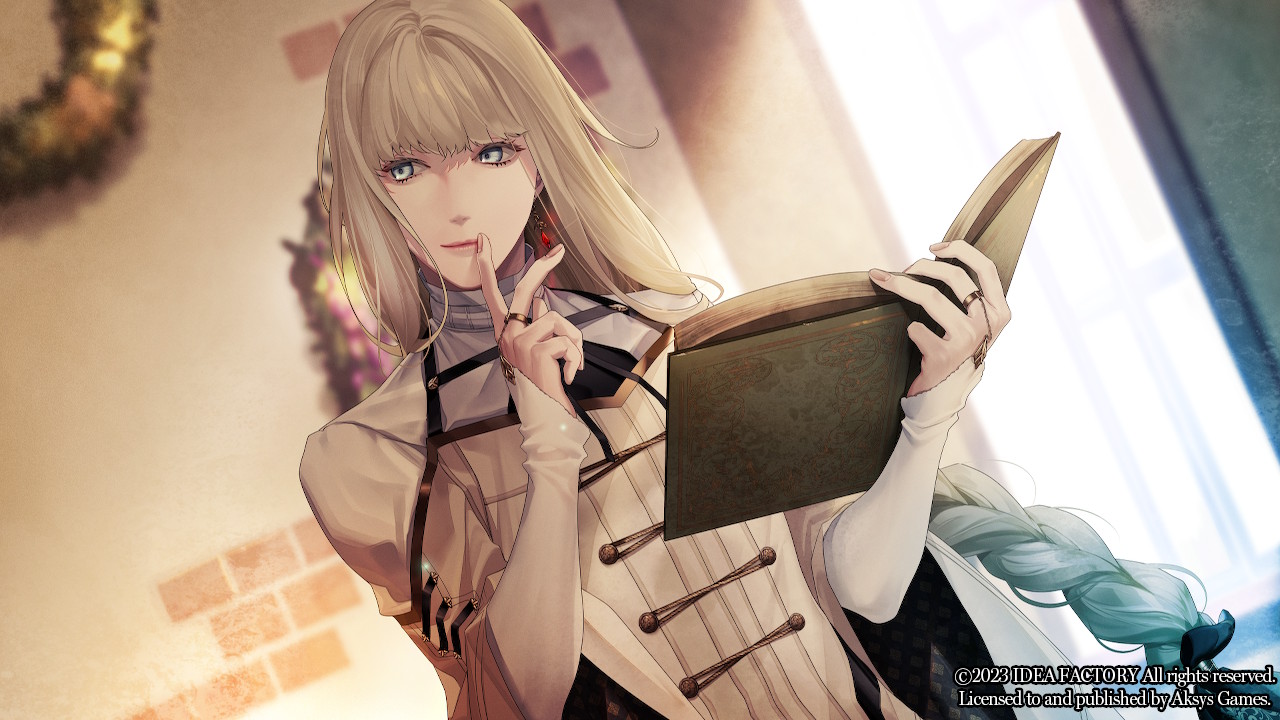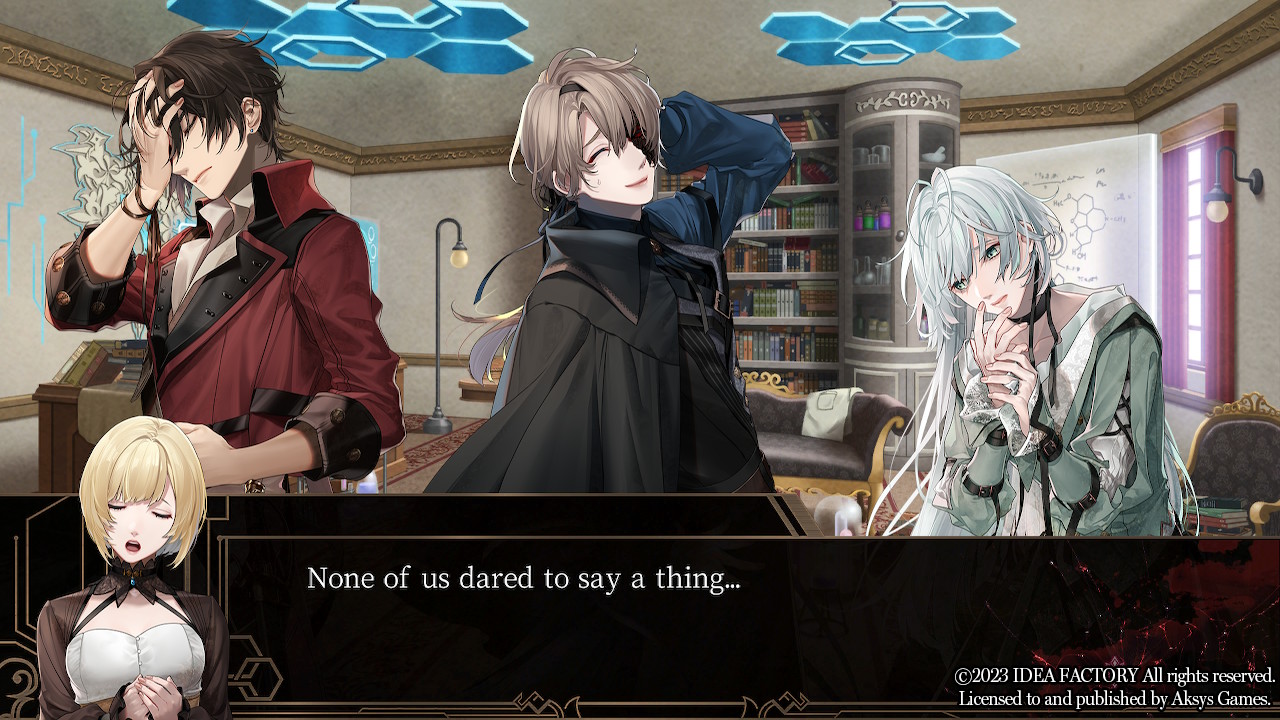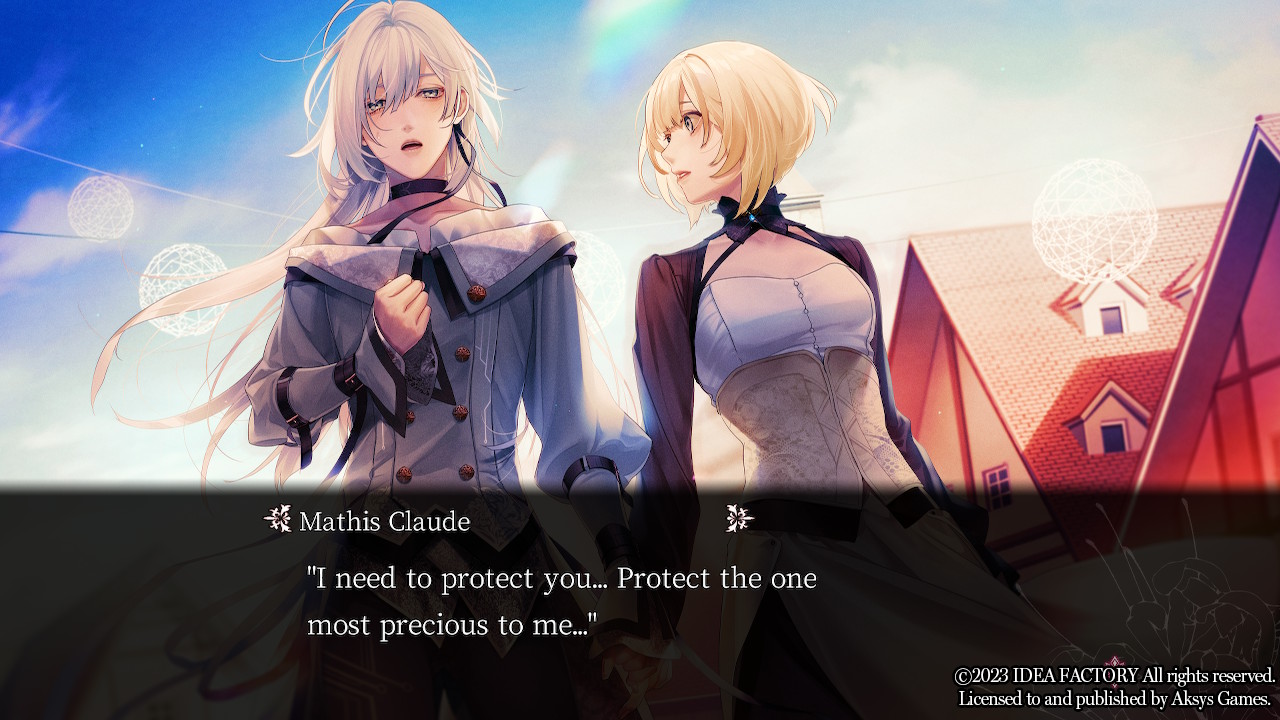System: Switch
Release date: November 9, 2023
Developer: Idea Factory
Publisher: Aksys Games
Curling up with a book is one of my favourite pastimes, and I have always thought that the Switch’s handheld mode makes it the perfect fit for visual novels because of this. Fortunately Aksys Games agrees with me, and has supported the system with a plethora of otome since it first released. With Virche Evermore – ErroR: Salvation, the publisher has brought a noticeably dark story that, although it won’t appeal to everyone, stands out for its exceptional worldbuilding, engaging cast, and superb presentation.
Virche Evermore is set on Arpéchéle, a fictional island located somewhere in Europe which is beset by a rather intriguing set of circumstances. On this island, nobody can live past the age of twenty-three, and will die from a mysterious curse either once they reach this seemingly arbitrary age or shortly before then. Fortunately a scientist found a way around this, developing a process that enabled people to be “backed up” and then transferred to a new body upon death, becoming a “Reliver” and evading the curse. The price for this is the loss of their emotions; most importantly, feelings of love are stripped away from them upon reincarnation, removing attachments they may have felt to others in their previous life.
Our protagonist (who you can rename if you choose) is Ceres, a young woman feared and scorned by the populace for her reputation as a figure of Death: anyone who gets close to her dies. She’s bounced from home to home over her eighteen years of life, and been responsible for numerous tragedies: worse still as her victims haven’t had their memories backed up, they cannot be revived as Relivers. This has become far too much for Ceres to bear at this point, and in a field of Lycoris flowers (which are regarded with equal suspicion, believed to be the cause of the curse in the first place) she plans to take her own life. She is stopped from completing the deed by a man calling himself the “Watchman of Death” who temporarily lifts her burden to allow her to unravel the mysteries surrounding the island: the curse, the murders that have been happening – both those known and yet to be discovered – and her own misfortune.


Arpéchéle is an absolutely fascinating place, and the worldbuilding in Virche Evermore is a particular highlight. It blends advanced science fiction with fantasy seamlessly with a clear transition that feels entirely natural. One minute you’ll be in an almost medieval setting with Ceres at the orphanage where she resides, and the next you’ll be driving an electric car to an advanced scientific facility where people’s personalities and memories are transferred into clone bodies. New terminology is frequently highlighted in red and added to the glossary, allowing you to either dive in for a more comprehensive explanation or continue on and accept things at face value as is your preference.
Virche Evermore takes every opportunity to dive into these themes, and can be quite profound at times as it explores the boundaries between life and death, the class divide between Relivers and humans (some choose not to become Relivers, preferring instead to live out the time allotted to them and not lose their emotions) and the nature of human emotion. Despite this, it always takes the time to remind you that these are normal people living the best lives that they can given their circumstances, and there is a lot of light-hearted banter and revelry to be found between the more dramatic moments; the boys will get roaring drunk together, and Ceres will get an overwhelming desire to clean something, completely ignorant of the social discomfort she might cause by doing it. It’s difficult not to grow attached to the main cast as they play off one another well with their distinct personalities, and the writing here is engaging.
But thematically this is not a game that is going to appeal to everyone: violence is a prevalent motif throughout, and if you’re sensitive to domestic abuse, self-harm, and suicide, this is a visual novel that you should give a very wide berth. At times, Virche Evermore is perhaps a little too edgy for its own good, and regularly interrupts its light-hearted moments in very jarring and discomforting ways. You can find characters sharing a quiet, joyful moment together when suddenly they’re drenched in blood as a murderous psychopath comes stalking out from a nearby alleyway having murdered a helpless victim and ripped the heart from their chest in an obvious metaphor that would be almost comical but for the senseless brutality of it. The pacing can feel a little off at times, as the writing will suddenly take a dramatic shift in tone and tempo after having laboriously spent its time on something charming but utterly irrelevant in the grand scheme of things.
Fortunately Virche Evermore handles its more delicate topics with sensitivity and grace, never lingering on them to the point that it becomes overbearing, even if it frequently goes to excessive lengths to describe bloody murder scenes and grisly deaths. I found that this bizarre juxtaposition of levity and savagery makes the impact of both feel more significant overall, but that it did occasionally cross over the line to feel a little far fetched. It serves a purpose, but as explanations are not forthcoming until much later in the story, you’ll likely have become so accustomed and desensitized to the gratuitous violence that it won’t resonate as well as it might have had these events been less prevalent, or at least less graphic.


Virche Evermore gives you four love interests to pursue, all stemming from a common route, and caps it all off with La Salut, which ties its disparate plot threads together in an emotional rollercoaster that occasionally takes some absurd leaps in logic but somehow manages to make it work in an emotionally charged conclusion. Your mileage will inevitably vary with the cast, but each one contributes something to the wider narrative and has a different focus that keeps their route feeling distinct and their character feeling unique, even if they aren’t necessarily likable in and of themselves. I found that even with the characters I was less fond of, there was something to be gained from reading through their individual story, contributing to the overarching narrative at play, or just fleshing out the world with glossary entries I wouldn’t have gained otherwise.
Their chemistry and relationship with Ceres is similarly unique and brings something to her as a character. As a protagonist Ceres is perhaps not as well-developed as she could be and I found that she often fell flat as she fluctuated from a desire to change and overcome the perception others had of her and as a housemaid perfectly happy to stay at home and do the cleaning. Her more mundane moments keep her feeling grounded, but she often feels more like a bystander in events rather than an active participant, and this can be off-putting in some scenarios. It’s unfortunate that she didn’t receive full voice acting (although this is not a common occurrence in otome games for the female protagonists) as it would have lent her more depressing moments a greater sense of weight. Her dialogue can come across a bit too self-pitying at times to make her a likable character and her situation and dialogue don’t make her a particularly good stand-in for the player.
But what will undoubtedly not sit well with many people is that you’ll need to experience each of the “Despair” endings of the love interests before you can view the True endings. Unlike most otome, which allow you to view the best endings without witnessing the bad endings, Virche Evermore will make you work for the happiness of the protagonists by first putting you through a gauntlet of horror. It feels quite sadistic and gratuitous at times, but I found that this heightened the emotional connection that I felt to the cast, and made that payoff at the end all the more satisfying. Experiencing the bad endings first also deepened my appreciation for the world of Arpéchéle and the reasons behind its current set of circumstances.


Perhaps because of this requirement, there aren’t quite as many dialogue choices to make in Virche Evermore as is typical of the genre, and nor are there that many different endings to experience. This can make it feel very hands-off at times as players have very little input or chance to develop their relationship with the characters in the way they choose, but the payoff here is a much more detailed and focused narrative. Personally I found this a refreshing change, as it meant much less micromanagement of save files at choices, and less time spent skipping through text I had already read to reach different endings.
The localization for Virche Evermore is excellent, and I didn’t notice any glaring typos or awkward translations. There are a number of font options to choose from if the default is not to your liking as well as the usual skip options present in all otome, allowing you to avoid going through previously read text on subsequent playthroughs. The flowchart also allows you to jump back to moments of choice, making the process of unlocking alternate pathways that much easier.
The artwork for the game is exceptional with character portraits being expressive and dynamic, lip syncing to their spoken dialogue and changing depending upon the situation. A few of the poses are a little exaggerated (I was never able to take Hugo seriously thanks to his ridiculous default one) and a little more variety wouldn’t have hurt, but there is more expression and detail here than is standard for the genre. The CGs sprinkled throughout are of a high quality and backgrounds are adequately detailed, although you will see them a few more times than you may wish to over the course of the game.
The game is fully voiced in Japanese and you can selectively adjust the volume of individual character voices. Normally this isn’t something I feel the need to engage with, but I made a special exception in Mathis’ case, and found his route much more bearable as a result. The music is more light-hearted than you may expect from a visual novel with such dark themes, although it can ramp up the tension where necessary, and the opening theme stands out to me as one of the best I’ve heard in recent years.
The Verdict


Virche Evermore – ErroR: Salvation is one of the most depressing and disturbing visual novels I’ve ever read, and I couldn’t be happier about it. Those averse to subjects such as suicide and self-harm will want to give this a wide berth as the game forces you to endure its darkest moments before it will allow you to witness its happier endings. But despite its almost gratuitous levels of violence, this is a story about finding love in the darkest of circumstances, and even if the otome genre isn’t necessarily to your taste there is well-crafted narrative here that is more than worth venturing into.
Related
- SEO Powered Content & PR Distribution. Get Amplified Today.
- PlatoData.Network Vertical Generative Ai. Empower Yourself. Access Here.
- PlatoAiStream. Web3 Intelligence. Knowledge Amplified. Access Here.
- PlatoESG. Carbon, CleanTech, Energy, Environment, Solar, Waste Management. Access Here.
- PlatoHealth. Biotech and Clinical Trials Intelligence. Access Here.
- Source: https://nintendoeverything.com/review-virche-evermore-error-salvation/
- :has
- :is
- :not
- :where
- $UP
- 1
- 300
- 9
- a
- Able
- About
- about IT
- absolutely
- abuse
- Accept
- across
- acting
- active
- added
- adequately
- adjust
- advanced
- After
- age
- Aksys Games
- All
- allow
- Allowing
- allows
- almost
- already
- also
- Although
- always
- an
- and
- Another
- any
- anyone
- appeal
- appreciation
- ARE
- around
- artwork
- AS
- At
- avoid
- away
- back
- backed
- backgrounds
- Bad
- BE
- Bear
- because
- become
- becomes
- becoming
- been
- before
- behind
- being
- believed
- beset
- BEST
- between
- Bit
- blends
- blood
- Bloody
- bodies
- body
- book
- both
- boundaries
- Brings
- brought
- burden
- but
- by
- calling
- CAN
- cannot
- caps
- car
- case
- Cause
- Chance
- change
- changing
- character
- characters
- charged
- chemistry
- choice
- choices
- Choose
- circumstances
- class
- clean
- Cleaning
- clear
- Close
- come
- comes
- Common
- completely
- completing
- comprehensive
- conclusion
- connection
- continue
- contributes
- contributing
- could
- course
- Cross
- Current
- curse
- Dark
- Date
- Death
- deaths
- Default
- Depending
- describe
- desire
- Despite
- detail
- detailed
- develop
- developing
- dialogue
- DID
- Die
- different
- difficult
- discovered
- disparate
- distinct
- dive
- divide
- do
- doing
- Domestic
- Dont
- dramatic
- driving
- dynamic
- each
- easier
- either
- Electric
- electric car
- emotion
- emotions
- enabled
- end
- engage
- engaging
- entirely
- equal
- error
- Europe
- Even
- events
- EVER
- Every
- everyone
- excellent
- exception
- exceptional
- excessive
- expect
- experience
- experiencing
- explanation
- explores
- expression
- expressive
- Face
- Facility
- FANTASY
- far
- fascinating
- feel
- feelings
- feels
- felt
- female
- Fetched
- few
- Fiction
- fictional
- field
- Figure
- Files
- Find
- finding
- First
- fit
- flat
- fluctuated
- Focus
- focused
- For
- Forces
- forthcoming
- Fortunately
- found
- four
- frequently
- from
- full
- fully
- gained
- game
- Games
- Gauntlet
- genre
- get
- Give
- given
- gives
- Goes
- going
- good
- grace
- grand
- graphic
- greater
- Grow
- had
- Handles
- Happening
- happier
- happy
- Have
- having
- heard
- Heart
- heightened
- her
- here
- High
- Highlight
- Highlighted
- himself
- his
- Home
- horror
- HTTPS
- hugo
- human
- Humans
- Hurt
- i
- idea
- if
- Impact
- importantly
- in
- individual
- inevitably
- input
- instead
- interests
- into
- intriguing
- island
- IT
- ITS
- Japanese
- jpg
- jump
- just
- Keep
- known
- later
- leaps
- least
- less
- levels
- Life
- like
- likely
- Line
- little
- live
- Lives
- living
- Localization
- located
- logic
- lose
- loss
- Lot
- love
- made
- Main
- make
- MAKES
- Making
- man
- manages
- many
- many people
- May..
- me
- meant
- medieval
- Memories
- might
- minute
- Mode
- moment
- Moments
- more
- most
- much
- murder
- Music
- my
- mysterious
- NARRATIVE
- Natural
- Nature
- necessarily
- necessary
- Need
- never
- New
- next
- nor
- normal
- normally
- Notice..
- noticeably
- novel
- number
- numerous
- obvious
- occurrence
- of
- off
- often
- on
- once
- ONE
- opening
- Opportunity
- Options
- or
- Others
- otherwise
- out
- over
- overall
- overarching
- Overcome
- overwhelming
- own
- participant
- particular
- particularly
- past
- pathways
- People
- people’s
- perception
- perfect
- perfectly
- perhaps
- Personalities
- Personally
- Place
- plans
- plato
- Plato Data Intelligence
- PlatoData
- Play
- player
- players
- plethora
- Point
- portraits
- poses
- present
- presentation
- prevalent
- previous
- previously
- price
- process
- profound
- protagonist
- publisher
- purpose
- pursue
- Putting
- quality
- quite
- Ramp
- rather
- reach
- Read
- Reading
- reasons
- receive
- recent
- Red
- regarded
- regularly
- relationship
- released
- removing
- reputation
- requirement
- Resonate
- responsible
- result
- review
- ripped
- rollercoaster
- Route
- Save
- scenarios
- scenes
- scheme
- Science
- Science Fiction
- scientific
- Scientist
- seamlessly
- see
- sense
- sensitive
- Sensitivity
- seriously
- serves
- set
- setting
- sharing
- she
- shift
- Shortly
- should
- significant
- Similarly
- since
- sit
- situation
- So
- Social
- some
- somehow
- something
- somewhere
- special
- spent
- spoken
- standard
- stands
- stay
- Still
- stopped
- Story
- subsequent
- such
- Suicide
- Supported
- Surrounding
- system
- Take
- takes
- taste
- Tempo
- terminology
- text
- than
- thanks
- that
- The
- the world
- their
- Them
- theme
- themes
- themselves
- then
- There.
- These
- they
- things
- this
- those
- thought
- Through
- throughout
- Ties
- time
- times
- to
- together
- TONE
- too
- Topics
- transferred
- transition
- Translations
- true
- typical
- undoubtedly
- unfortunate
- unique
- unlike
- unlocking
- unravel
- until
- upon
- usual
- value
- variety
- very
- Victim
- victims
- View
- visual
- Voice
- VOICES
- volume
- want
- was
- Way..
- ways
- weight
- WELL
- What
- when
- which
- WHO
- wide
- wider
- will
- with
- without
- witness
- witnessing
- woman
- Work
- world
- worse
- worth
- would
- writing
- years
- yet
- you
- young
- Your
- zephyrnet





